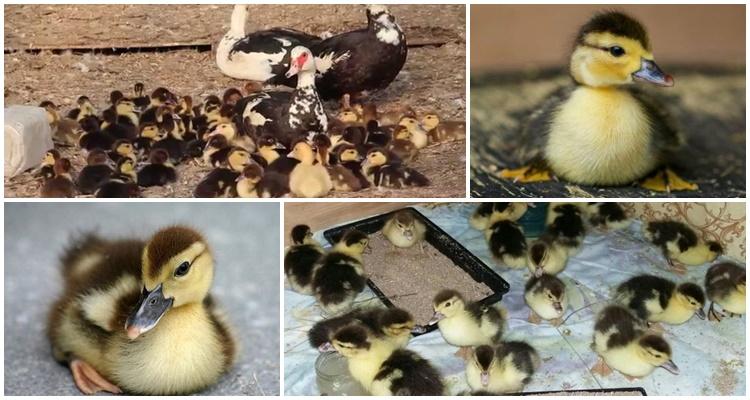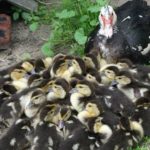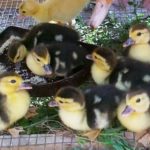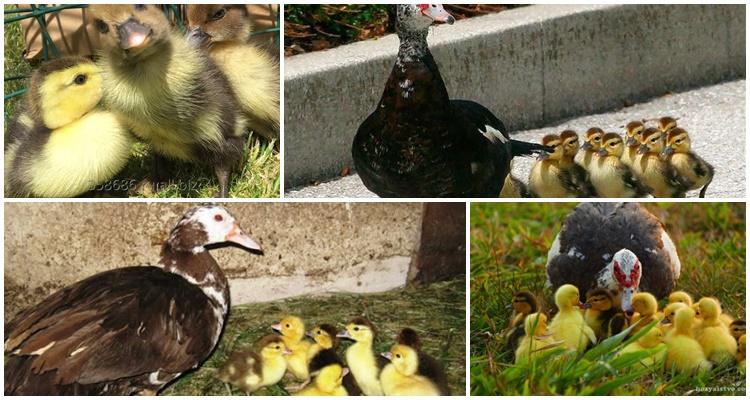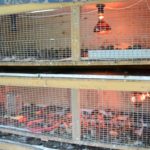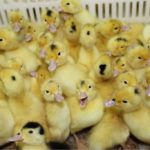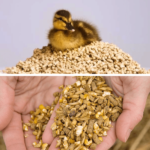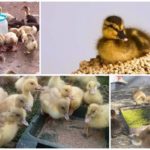Breeding ducklings at home is not as simple as it seems, even if the ducklings are not hatched in an incubator, but under a duck. It seems that you can entrust everything to the duck and not worry. But what to do with the ducklings after hatching, whether to take them away from her or not, how to feed and maintain them from the first days, what problems there may be, not every poultry farmer knows about this. Let's look at these questions in more detail.
Do I need to remove ducklings from under the duck?
If the duck is calm in character and proven, there is no need to take it.Ducklings, like all poultry chicks, hatch better under brood hens than in an incubator, and their survival rate is higher - almost 100%. They quickly learn everything the duck teaches them and get sick less. Many poultry farmers leave a brood with an indo-duck, especially in the summer, when it is warm, and hypothermia does not threaten them.
If a musk duck takes care of its offspring, then there is no need to interfere with it. But if it becomes clear that she abandoned the ducklings, which sometimes happens, then the only thing left is to pick them up and raise them in a brooder. But there is a situation when you have to take away ducklings even from a caring mother, despite the fact that she responsibly hatched them and shows no intention of abandoning them.
This should be done if a separate room cannot be allocated for the duckling with her offspring, where she will live until the ducklings grow up a little.
The fact is that it is impossible to keep a mother and children in a common herd; other ducks or drakes can easily trample them. All hens need to be isolated for a while, and if this cannot be done due to lack of free space, then all that remains is to take the ducklings.
Features of keeping ducklings from the first days of birth
If a decision is made to take the ducklings from an Indian duck, then this must be done immediately after she hatches them. The chicks are placed in a brooder. This is a special device where artificial conditions are created for raising young poultry. A feeder and drinker are installed in the brooder, an infrared lamp is hung on top, and the floor is covered with newspaper and paper, which are changed daily.
Small chicks bred by an Indian duck can be released for a walk with their mother, but not in a flock, but separately from everyone else.They can swim, so on the walk you can put a shallow container in which the baby ducklings will splash. The walking yard should be cleared of debris, especially items that could injure the chicks.
At the same time, if it’s cold, then you can’t let the baby duck out with the babies on the first day. It is better to leave them in the house, provide water and food. If it is very cold, then either the duck needs to be moved to a warm room for a while, or a way to heat the house must be found. This needs to be done because Indian ducks do not warm their offspring like chickens, but simply stand and the chicks sit nearby. Therefore, in a cold poultry house they will freeze.
What to feed
In the first 1-3 days after the ducklings hatch, they are fed boiled eggs, cottage cheese and herbs, just like chickens. Further steps: transfer to grain mash, which is made up of finely crushed chaff, boiled vegetables or root vegetables, finely chopped greens, and bran. They should be moist but not sticky. You can cook crumbly porridge, skim milk, and sour milk. Give duckweed if you can get it nearby, give more grass.
In order not to prepare food, you can feed the turkey chicks with compound feed. There are starter mixtures that can be given to ducklings in the first 1.5 weeks of life.
For 1.5-week-old ducklings, meat waste, boiled potatoes, vitamin preparations, and mineral premixes are mixed into the food. This is necessary to prevent rickets and make the immune system stronger. Feeding frequency:
- 1st week – 5-6 times, but little by little;
- up to a month – 4-5 times;
- 1-2 months – 3-4 times;
- before slaughter, as well as adult birds - 2-3 times.
When the ducklings have grown to at least a month old, they can be released into the flock. Adult birds will no longer pose a danger to them.
Possible problems
You should not touch already hatched ducklings until all the others have hatched from the eggs. When an Indian duck sees someone touching her offspring, she often abandons him. Therefore, you need to wait and then count how many hatched. The main problem that a poultry farmer has with newly hatched ducklings is that not all of them try to eat and drink, some do not know how to do this.
Therefore, until the ducklings learn to eat, you need to monitor whether everyone has eaten.
Indo-ducks that are fattened for meat are raised until they accumulate enough weight for slaughter. The problem in this case is the difficulty in determining the time when slaughter can be carried out. Usually, indo-ducks are slaughtered at the age of 2.5-3 months, since then molting occurs. Having a greater need for nutrients, they eat more, but their growth is in no hurry to increase. Therefore, only breeding birds can be left for further rearing.
Disease Prevention
Immediately after hatching, the babies are defenseless, fragile and vulnerable. Their immunity is still weak, which leads to diseases, the cause of which is insufficient cleanliness in the poultry house. Therefore, the place where the Indian duck sits must be clean. It is necessary to change the bedding, water for bathing, remove leftover food in the feeder so that it does not turn sour, and refresh the water.
Simple safety measures reduce the likelihood of infections, and therefore save the lives of babies. How to raise ducklingsThe poultry farmer decides whether to take them away from the Indian duck. An Indian duck, if she is balanced and intelligent, is capable of raising offspring herself. It has been noticed that the chicks under their mother do not get sick, grow quickly, and behave actively.There is always a lot of trouble with artificially raised baby ducklings. Therefore, if everything is fine, there is no need to take them away from the duck.

